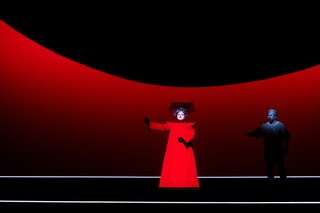|
Back
High style, muted drama Toronto
The Four Seasons Centre for the Performing Arts
09/28/2019 - & October 4*, 9, 15, 17, 19, 23, 25, 27, 2019
Giacomo Puccini: Turandot
Tamara Wilson*/Marjorie Owens (Turandot), Sergey Skorokhodov/Kamen Chanev (Calaf), Joyce El-Khoury*/Vanessa Vasquez (Liù), David Leigh*/Onay Kose (Timur), Adrian Thompson (Emperor Altoum), Adrian Timpau (Ping), Julius Ahn (Pang), Joseph Hu (Pong), Joel Allison (A Mandarin), Matthew Cairns (Prince of Persia)
The Canadian Opera Company Chorus, Sandra Horst (chorus master), The Canadian Opera Company Orchestra, Carlo Rizzi (conductor)
Robert Wilson (direction, design and lighting concept), Nicola Panzer (co-director), Stephanie Engein (co-set designer), John Torres (co-lighting designer), Jacques Reynaud (costume designer), Manu Halligan (make-up designer), Tomek Jeziorski (video artist), José Enrique Macián (dramaturg), Richard Lee (production consultant)

T. Wilson & S. Skorokhodov (© Michael Cooper)
Turandot was last produced by the Canadian Opera Company back in 2004 in a spare but reasonably effective production. This time we get a high-styleproduction by Robert Wilson (shared with Madrid, Vilnius, and Houston). The term “avant-garde” is used to describe his stylistic approach, with performers moving very little, never touching or making eye contact with one another.
At first I was reminded of China’s famous terracotta army but I realize that no such refereance was intended as Wilson’s intentions lie elsewhere. In some ways his stylization works, as much of the music and story comes across as a ceremonial retelling of a well-known tale, with both the questing Calaf and the obdurate Turandot as mythic types. The third mythic figure is the Emperor, Altoum, who is lowered from the fly tower and hovers over his lengthy scene; this is very effective, and Adrian Thompson’s voice is notably stronger than the usual distant, wavering delivery of the role.
Messier emotions intrude, however, with the arrival of the all-too-human Liù and and Calaf’s blind father. The dramatic brutal seizure of the two and Liù’s subsequent suicide are radically downplayed. The death is enacted by Joyce El-Khoury simply putting her hand over her heart and tilting her head. At the work’s climax, when Turandot announces she has found love, Calaf fades into the murky background. Turandot remains strikingly and puzzlingly alone at the end.
It all has a minimalist, rather chic, look, with an ever-present (and eye-fatiguing) bright strip of white light across the stage front. Perhaps it is considered naïve to expect a drama that equals the intensity of Puccini’s music.
Another change lies in renaming the characters Ping, Pang, and Pong (“linguistically stereotyped” according to production consultant Richard Lee’s notes) as Jim, Bob, and Bill. However, their prancing stage movements recall a visual stereotype of an effete Asian (rather like Auntie Mame’s houseboy, Ito). The roles are certainly well sung.
The performance is musically - and vocally - very persuasive. Carlo Rizzi brings out the score’s full range from grandeur to ethereal. The chorus, boosted to about 60 members, is even better than usual. Tamara Wilson, in her fifth role with the COC, produces all the required steeliness. It is understandable that she is now in demand in places like La Scala.
Russian tenor Sergei Skorokhodov possesses a voice with an attractive Italian sound that is evenly produced from bottom to top. (No hollering from him in a role that can veer in that direction.) Joyce El-Khoury sensuously molds Liù's delicate lines to maximum effect.
Thanks at least to Carlo Rizzi we can understand why Puccini’s final opera has turned out to be the last one to enter the worldwide core repertoire.
Michael Johnson
|